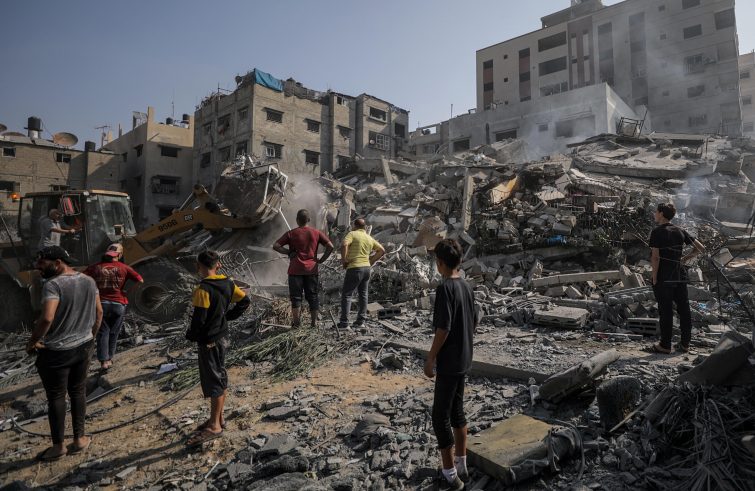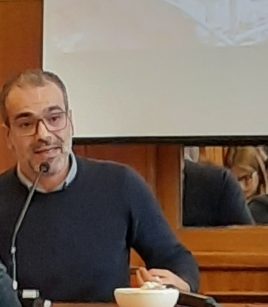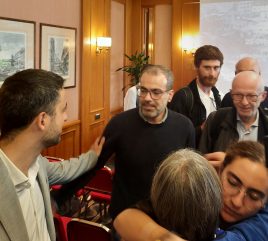
Amnesty International and the more than 50 Italian non-governmental organisations members of AOI (Association of Italian Cooperation and International Solidarity Organisations) appealed to the Italian Government and Parliament to put respect for human rights and the lives of civilians at the centre of their political efforts to “lift the blockade on Gaza and guarantee access to essential goods and humanitarian aid destined for the civilian population in Gaza.” They also called on the Italian government “to promote respect for international humanitarian law by refraining from supplying weapons to all warring parties, while openly supporting the International Criminal Court’s investigations into crimes committed in the region.” According to official figures, at least 1,402 people have been killed in Israel and 6,546 in Gaza since October 7, including 2,746 children, 17,439 wounded and 1.4 million displaced. Not counting those trapped under the rubble.
 “The level of injustice has reached a height that is unprecedented in history. Waiting for your turn under the bombs in Gaza means losing all hope. Why should the blood of a Palestinian child be worth less? How many more deaths will it take to put an end to this? Yousef Hamdouna, a Palestinian humanitarian worker with the association Educaid, gave a moving account. He now works for his land, having started out as a beneficiary of solidarity projects. He was in Italy before the siege began, but his whole family is in Gaza. He lost a daughter to Israeli bombs in 2014: “Since then,” he says in a heartbroken voice, as a wave of emotion sweeps over the room, “I can’t forgive myself for not having been able to save her.” Last night he learned of the death of relatives and friends, while all his brothers had their homes destroyed in the bombing. “It’s an unimaginable situation. I’ve lived under bombs before, but this time it’s worse.
“The level of injustice has reached a height that is unprecedented in history. Waiting for your turn under the bombs in Gaza means losing all hope. Why should the blood of a Palestinian child be worth less? How many more deaths will it take to put an end to this? Yousef Hamdouna, a Palestinian humanitarian worker with the association Educaid, gave a moving account. He now works for his land, having started out as a beneficiary of solidarity projects. He was in Italy before the siege began, but his whole family is in Gaza. He lost a daughter to Israeli bombs in 2014: “Since then,” he says in a heartbroken voice, as a wave of emotion sweeps over the room, “I can’t forgive myself for not having been able to save her.” Last night he learned of the death of relatives and friends, while all his brothers had their homes destroyed in the bombing. “It’s an unimaginable situation. I’ve lived under bombs before, but this time it’s worse.
In Gaza they call it ‘Doomsday’, they have never seen anything like it.”
One of his colleagues was pulled out of the rubble, but all her family members are dead. “She told me: I don’t know if I was lucky or if my family is luckier than me. The numbers are the people. You don’t need to be a scientist or a mathematician to say that civilians are dying. There are two million people who want to stay in their homes, but no one is helping them.”
 Italian NGOs, they are in need of everything in Gaza. Just as we immediately and unequivocally condemned the Hamas massacre, today we echo the words of UN Secretary-General Antonio Guterres, who reminded us that the Hamas attacks “did not take place in a vacuum.” The Palestinian people have been subjected to 56 years of crushing occupation”, and while it’s true that “the suffering of the Palestinian people is no justification for Hamas’s appalling attacks”, it’s also true that “these appalling attacks are no justification for the collective punishment of the Palestinian people”, said Silvia Stilli, President of AOI. “Our staff tell us that everything is needed in Gaza: fuel for hospitals and ambulances, food and water, electricity, essential and emergency supplies, and medical teams. Hospitals are overcrowded and doctors are forced to work in the corridors. The Rafah crossing has been open for two days, allowing very few truckloads of humanitarian aid to enter, less than 20% of pre-crisis supplies. More crossings must be opened.” Stilli appealed directly to Prime Minister Giorgia Meloni to “work for an immediate cessation of hostilities and the release of the hostages.
Italian NGOs, they are in need of everything in Gaza. Just as we immediately and unequivocally condemned the Hamas massacre, today we echo the words of UN Secretary-General Antonio Guterres, who reminded us that the Hamas attacks “did not take place in a vacuum.” The Palestinian people have been subjected to 56 years of crushing occupation”, and while it’s true that “the suffering of the Palestinian people is no justification for Hamas’s appalling attacks”, it’s also true that “these appalling attacks are no justification for the collective punishment of the Palestinian people”, said Silvia Stilli, President of AOI. “Our staff tell us that everything is needed in Gaza: fuel for hospitals and ambulances, food and water, electricity, essential and emergency supplies, and medical teams. Hospitals are overcrowded and doctors are forced to work in the corridors. The Rafah crossing has been open for two days, allowing very few truckloads of humanitarian aid to enter, less than 20% of pre-crisis supplies. More crossings must be opened.” Stilli appealed directly to Prime Minister Giorgia Meloni to “work for an immediate cessation of hostilities and the release of the hostages.
Put an immediate end to the collective punishment of an entire innocent population identified with Hamas. A cease-fire, a cease-fire.”
Amnesty: “These are war crimes. I say ‘no’ to selective condemnation and selective solidarity”. “It is necessary to call a spade a spade: these are war crimes and violations of international humanitarian law. But instead, the focus is on the actors and not on the actions, with very biased narratives”. Riccardo Noury, Amnesty International spokesperson, said: “In the West, including in the media, it has been decided to focus only on the actors, with double standards, selective condemnation and selective solidarity. “War crimes have been committed by Hamas and the Israeli military, with indiscriminate air strikes without warning. Israel’s claim that it warns before bombing is false,” Noury insisted. “We have confirmed five attacks without warning and one in which people were sent to the open market to die under the bombs.” Moreover, he added, “the idea of providing humanitarian aid without justice leads nowhere.” “Mercy is dead,” added Luisa Morgantini, president of Assopace Palestine: “This is not just a humanitarian issue, the military occupation is recognised by the entire international community as a violation of international law. We are calling for a ceasefire, but we are also calling for an end to the military occupation in Gaza and the West Bank.”
 Too many weapons sent to the Middle East. It is impossible to end a conflict unless other countries stop sending arms. “One third of the world’s military exports have been destined for the Middle East in the last 10 years,” said Maurizio Simoncelli of the Peace and Disarmament Network and the Assisi Just Peace Coalition: “54% were sent from the United States, 12% from France, 8.6% from Russia and 8.4% from Italy.
Too many weapons sent to the Middle East. It is impossible to end a conflict unless other countries stop sending arms. “One third of the world’s military exports have been destined for the Middle East in the last 10 years,” said Maurizio Simoncelli of the Peace and Disarmament Network and the Assisi Just Peace Coalition: “54% were sent from the United States, 12% from France, 8.6% from Russia and 8.4% from Italy.
“Italy has its responsibilities: since 2005 there has been a fourfold increase in our exports and 30/40% of the arms exports in the period 2012-2022 went to North Africa and the Middle East. So we should not be surprised by what has happened.”











